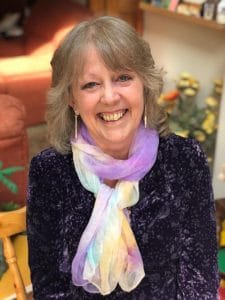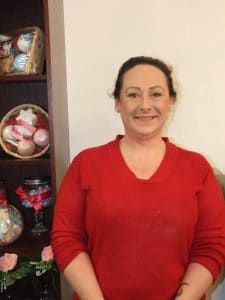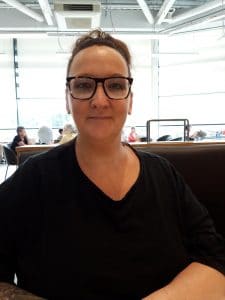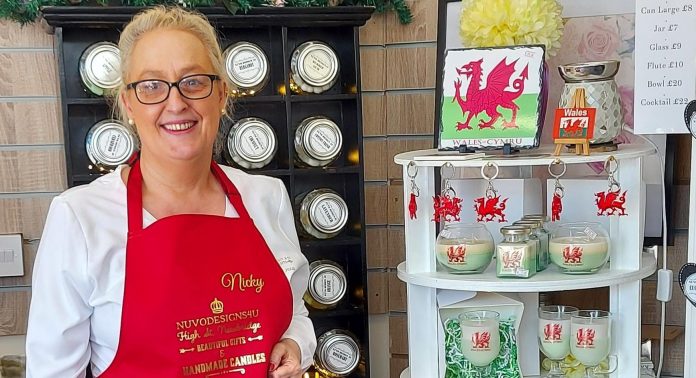Karen Davies, below, founder and chief executive of Purple Shoots, explains how the innovative company she set up 10 years ago is helping build businesses and tackle poverty.
 Purple Shoots was set up with a big aim of tackling poverty, unemployment, financial exclusion and social isolation, initially in Wales, through providing traditional microfinance: small ethical loans to individuals who could not raise finance from any other source to enable them to start or run a small business. Some 96 per cent of our borrowers are on benefits when they receive a loan from us. We work with people who have been left behind by our economy to help them create pathways out of poverty and into economic stability. 70 per cent of our lending is in areas with higher indices of multiple deprivation – 25 per cent is in the worst 10 per cent. We also create self-reliant groups – these are small collectives which encourage people to take back control of their lives, build on the skills they have, learn new ones and move towards greater financial resilience, reduced isolation, income generation and work.
Purple Shoots was set up with a big aim of tackling poverty, unemployment, financial exclusion and social isolation, initially in Wales, through providing traditional microfinance: small ethical loans to individuals who could not raise finance from any other source to enable them to start or run a small business. Some 96 per cent of our borrowers are on benefits when they receive a loan from us. We work with people who have been left behind by our economy to help them create pathways out of poverty and into economic stability. 70 per cent of our lending is in areas with higher indices of multiple deprivation – 25 per cent is in the worst 10 per cent. We also create self-reliant groups – these are small collectives which encourage people to take back control of their lives, build on the skills they have, learn new ones and move towards greater financial resilience, reduced isolation, income generation and work.
We have supported people like Ruth Hancock. Ruth was in debt and struggling after a long-term illness. Today, through the business she created, she is now debt-free, employing others with a thriving artisan soap business making a huge range of amazing products which are sold locally and to some big organisations, with services for weddings, children, corporates and more ideas every day.
Or Nicky Stephenson who, while recovering from a childhood history of abuse and a long-term caring responsibility, has created a business which is at the heart of a local community. She contributes not just to her own wellbeing and financial resilience but also generously supports local activities.
Our loans are transformational, putting people on a sustainable pathway away from poverty and debt. In addition to supporting individuals to create their own business and move themselves into better financial circumstances, these businesses also create wealth in their local communities – money earned is spent there, local people are employed, local suppliers are used. It could be argued that these small businesses are greener as a result.
Our aim is to enable people held back by circumstances or disadvantaged in some way to reach their potential and to be the contributors to their local economies and communities that they want to be.
During the Covid-19 crisis, these businesses have proved to be adaptable and flexible, and committed to their communities. Lisa, for example, had to close her cake shop during the lockdowns, received no government support at all but still managed to get her kitchen at home approved by the environmental health officials and traded from there, delivering cakes locally and even making and giving away hundreds of packed lunches to families who were struggling.

The economic impact of this type of lending is ten times the amount loaned. In addition, a study of this form of microfinance in 2012 (a little dated perhaps but relevant circumstances are not hugely different now) showed that there is a net gain to HMT of £3-£4 for every £1 loaned this way (in benefits saved, taxes paid, etc).
The loans are straight forward term loans over 1-3 years at an interest rate of 14.5% per annum (APR 25.7%) for new clients. We do not charge a lending fee or early repayment penalties. We lend only to the most disadvantaged clients who are struggling to find finance from any other source. To do this effectively, we use face-to-face interaction and provide mentoring and support both before and after making the loan. Our maximum loan size is £4,000 – there is no minimum but it is unusual for us to lend below £500. The average loan size is £2,700.
When making our decisions, we look at the person and the proposed business. We want to be sure that the business is going to work and will deliver a sufficient income and that the person proposing it can make it happen – so we are looking at future potential rather than getting hung up on any mistakes in the past (which may have led to a poor credit score).
In the last eight years, we have made 715 small loans, lending a total of over £1.68m. Our lending has created 550 new businesses and supported 165 existing ones (some of which we have supported from the start and for onward growth), generating employment for around 760 people to date, and impacting thousands of others. We fund innovative small businesses who are responding to needs and demands around them, thus contributing to a growing network of small entrepreneurs which is changing the economic base of communities.
We are reducing inequality in the areas where we work by supporting the most disadvantaged individuals and groups and enabling them to improve their circumstances. Everything we do is aimed at building better communities, seeking to support those who are marginalised and excluded from the economy so that they can become contributors, and doing this in a way which creates lasting change.
Our self-reliant groups are based on a proven model from the third world and are aimed at people not quite ready to start a business but who still want to make changes in their lives. Our typical self-reliant group members are very far from the workplace, often extremely isolated and for whom just leaving the house can be a major achievement, lacking in confidence and believing that they have little to offer. The groups create a nurturing environment which enable members to overcome this, share and develop new skills and take back control of their lives.

We have a number of groups comprised of people with disabilities – the support within the group enables them to test out income generating ideas and new skills, and even business ideas which can work around their disabilities. We have had particular success with people with learning disabilities where each group member is valued and enabled to make their own unique contribution to the group’s activities. We also have many successful groups of able-bodied people and collectively the groups are beginning to be a movement for change, with group members building on their own ideas and creating pathways to better circumstances.
Groups meet weekly and start off building relationships and a network of trust with each other. They look at their own skills and decide on the direction the group will take. All groups usually save small sums of money together each week and this builds into a fund which gives them choices – some use it to support each other, others use the funds to develop enterprising or community focused ideas.
Although the groups can help to improve their members’ financial circumstances, the thing members seem to value the most is the support and friendship their group provides. Purple Shoots facilitates new groups initially, but eventually the groups become independent and self-sufficient. Membership of a group enables individual members to take positive steps forward to improve their lives in some way.
Through our loans and our self-reliant groups, we build capacity, independence and confidence to often marginalised individuals who have previously struggled with employment. We aim to drive positive and sustainable change for “hidden” entrepreneurs, allowing them to flourish – improving their lives, the community they live in and the wider economy. We believe that many small businesses developed and funded in an inclusive way create the sort of resilient and prospering communities in which we all want to live.
Having begun in Wales, we have expanded to the West Country and to Yorkshire – and our aim is to expand to the rest of the UK. We want to see every individual with access to finance if they have aspirations to start and run their own business, so that they are enabled to change things for themselves in a sustainable, permanent way, and every community with access to the network of support which our self-reliant groups offer.
We trust people to be able to create and follow their own pathways, which is far more dignified than many well-meaning programmes of help which seem to assume that people who are poor or out of work are in need of training or help, some form of hand holding. Our experience is that this is usually not the case – many people are simply searching for opportunities and the wherewithal to seize them or a sensible route to enable them to make positive changes in their lives. We believe that everyone is valuable and has something they can contribute to enrich their local communities and often only needs an opportunity and perhaps a small loan to enable them to realise their potential.
We took a decision early on not to charge the high levels of interest which are typically charged to this client group (100% APR by some of the best ethical alternatives). This means that our income cannot cover the costs of making the loans, particularly as our clients are starting from very financially vulnerable positions which means that defaults and missed payments are quite common. Running our self-reliant groups also has a cost – although we have a very small and efficient team.
This means we need to raise a mix of donated and invested (borrowed) money in order to keep going. Invested money has historically come from individuals who can benefit from Community Investment Tax Relief but we are speaking also to social investors at present. Donations come from grant making bodies and from individuals and corporates giving regularly – we are constantly seeking to build our base of regular givers to enable us to continue to grow what we do.
Funding what we do is always a big challenge and remains as the biggest inhibitor to our growth. We have never managed to attract Government support in spite of the mounting evidence of our social and economic impact. Since the UK left the European Union, there has been no loan guarantee scheme to replace the one offered by the European Investment Bank for microfinance. There is no other UK government support to help with the cost of doing this type of lending.
British Business Bank, which has a remit to contribute to the levelling up agenda, offers loan guarantees but only to larger lenders – at present Purple Shoots cannot benefit from this Government support and yet large, profitable financial institutions, including all the big banks, can. These loan guarantees are currently under review and we are lobbying to be included in any new scheme. This would significantly reduce our need for donated funds.
Parts of the benefits system present a challenge to our client group and therefore to us as it can work against people trying to get on a pathway to creating their own income, cutting away too quickly for someone who starts a business so that the business is vulnerable with no build-up of reserves for sometimes two years and the client remains struggling that long. That is a cause of many business failures.
In addition, our self-reliant group members are afraid to earn any money because of the impact on their benefits. Especially now with the cost of living crisis, DWP should allow more “side hustles” without it triggering a loss of benefits or a review of benefits so that people are able to supplement their income, and in the case of our group members, to test out enterprises and their ability to run them before burning their boats with the benefits system.
So the next biggest challenge after funding is the need to tweak the benefits system so that it encourages self-employment rather than the opposite. If you lose your job – through illness, a redundancy or a life crisis for example – or if you struggle to find work, the spiral down into financial difficulties can be very fast. Benefits, when/if you finally get them (it takes weeks) are not enough to pay for commitments you may have had when you were working.
Defaults on payments inevitably follow, followed by a rapidly declining credit score. Then, if you want to change and improve your circumstances through self-employment, you will find that no lender, not even the Government-backed start up loans, will support you. Purple Shoots is the only lender in the UK prepared to support people in circumstances like these.
There should be Government recognition of the value of small business to the economy and of small ethical lenders supporting them. It is such an injustice that we cannot qualify for any of the supportive loan guarantee systems offered by British Business Bank because of our size – and yet much larger lenders, who need the support far less and who do not support our client group, can all benefit from it. I think it is because Government wants big, easier “wins” but doesn’t see that very many small “wins” equals one big one.
The people we support make us proud over and over again. People who have been written off by other lenders and other people or even themselves, who prove them wrong by creating really fantastic businesses or doing amazing things through their self-reliant groups. Purple Shoots has helped them to help themselves and their communities and to create lasting change.


